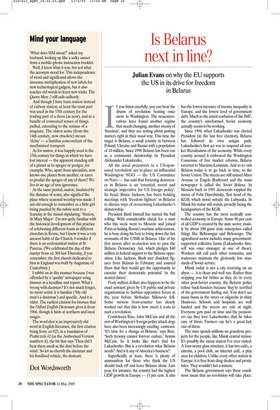Mind your language
‘What does SIM mean?’ asked my husband, looking up like a sulky sunset from a mobile-phone instruction booklet.
Well, I knew what it was, but not what the acronym stood for. This independence of word and significand allows the tiresome multiplication of new labels for new technological gadgets, but it also teaches old words to learn new tricks. The Queen Mary 2 still sails saillessly.
And though I hate train station instead of railway station, at least the train part was used in the 15th century for the trailing part of a dress (as now), and in a bundle of connected senses of things pulled, extending to the retinue of a magnate. The oldest sense (from the 14th century, now obsolete) means ‘delay’ — a familiar concomitant of the mechanised transport.
As for station, it was happily used in the 15th century for things in which we have lost interest — the apparent standing still of a planet at its apogee or perigee, for example. Who, apart from specialists, now knows one planet from another, or cares to predict the apogee of any of them? We live in an age of new ignorance.
At the same period, station, insulated by the distance of sense, also signified the place where seasonal worship was made. I am old enough to remember as a little girl being puzzled by the rubric next to a feastday in the missal stipulating: ‘Station, St Mary Major’. I’m not quite familiar with the historical development of this practice of celebrating different feasts at different churches in Rome, but I know it was a very ancient habit of the Church. I wonder if there is an ecclesiastical station at St Pancras. (We celebrated the day of this martyr from AD 304 last Thursday, if you remember; the first church dedicated to him in England was built by Augustine of Canterbury.) I rabbit on in this manner because I was offended by a ‘quality’ newspaper using binman in a headline and report. What’s wrong with dustman? It’s not much longer, no more sexist; it is familiar (‘My old man’s a dustman’) and specific. And it is older. The earliest citation for binman that the Oxford English Dictionary gives is from 1966, though it hints at northern and local usages.
The word dust is an impressively old word in English literature, the first citation being from AD 825, in a translation of Psalm xviii 42 (as the Authorised Version numbers it), the bit that says ‘Then did I beat them small as the dust before the wind.’ So let us cherish the dustman and his fossilised vehicle, the dustcart.


































































 Previous page
Previous page